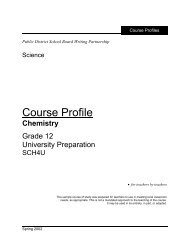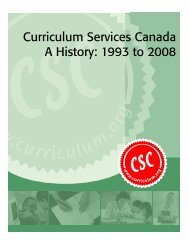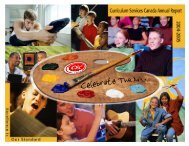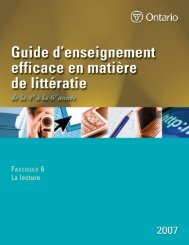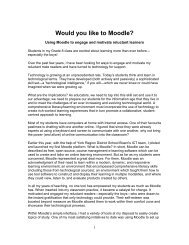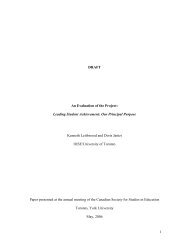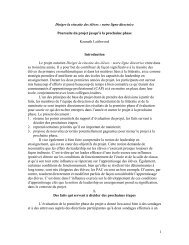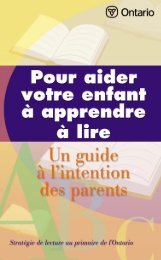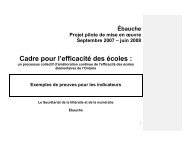Course Profile - Curriculum Services Canada
Course Profile - Curriculum Services Canada
Course Profile - Curriculum Services Canada
You also want an ePaper? Increase the reach of your titles
YUMPU automatically turns print PDFs into web optimized ePapers that Google loves.
Activity 2: Poetry Comes Alive: Reading and Exploration<br />
Time: 180 minutes<br />
Description<br />
In this activity students are introduced to a variety of poetic forms, e.g., the ballad, the lyric, the sonnet,<br />
and the narrative. A variety of poets are also explored. An emphasis on Canadian poets is recommended,<br />
e.g., Alden Nowlan, Margaret Atwood, Raymond Souster, Gwendolyn McEwen, E. J. Pratt, Earl Birney,<br />
Elizabeth Brewster, Michael Ondaatje, and Susan Musgrave. Other favourites include Robert Frost,<br />
William Shakespeare, William Wordsworth, Elinor Wiley, Emily Dickenson, and Christina Rossetti. In<br />
exploring the thematic concerns of the poems, students are encouraged to see God’s hand at work in both<br />
the creation of the universe and in the eternal cycle of human relationships.<br />
Strand(s) and Expectations<br />
Ontario Catholic School Graduate Expectations:<br />
1g - understand that one's purpose or call in life comes from God and strive to discern and live out<br />
this call throughout life's journey;<br />
2a - listen actively and critically to understand and learn in light of gospel values;<br />
4a - demonstrate a confident and positive sense of self and respect for the dignity and welfare of<br />
others;<br />
4b - demonstrate flexibility and adaptability;<br />
5a - work effectively as an interdependent team member;<br />
7j - contribute to the common good.<br />
Strand(s): Literature Studies and Reading, Language, Writing<br />
Overall Expectations:<br />
LIV.01D - read and demonstrate an understanding of a variety of literary and informational texts,<br />
from contemporary and historical periods;<br />
LIV.03B - identify and explain the effect of specific elements of style in a variety of literary and<br />
informational texts;<br />
WRV.02D - identify the literary and informational forms suited to various purposes and audiences and<br />
use the forms appropriately in their own writing, with an emphasis on supporting opinions or<br />
interpretations with specific information;<br />
LGV.01D - use knowledge of vocabulary and language conventions to speak, write, and read<br />
competently using a level of language appropriate to the purpose and audience;<br />
LGV.02B - use listening techniques and oral communication skills to participate in classroom<br />
discussions and more formal activities, such as storytelling, role playing, and reporting/presenting, for<br />
specific purposes and audiences.<br />
Specific Expectations:<br />
LI1.01D - describe information, ideas, opinions, and themes in print and electronic texts they have read<br />
during the year from different cultures and historical periods and in a variety of genres, including<br />
novels, short stories, plays, poems, biographies, short essays, articles from newspapers magazines, and<br />
encyclopedias;<br />
LI1.03B - describe a variety of reading strategies and select and use them effectively before, during,<br />
and after reading to understand text;<br />
LI1.06B - use specific references from a text to support opinions and judgments;<br />
LI1.07D - explain how readers' different backgrounds might influence the way they understand and<br />
interpret a text;<br />
WR3.01D - use a unifying image, mood, or voice to structure descriptive paragraphs or poems;<br />
Unit 3 - Page 4<br />
•English - Academic



